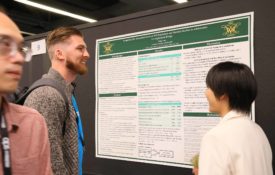-
People in the U.S. Think They Are Better Than They Actually Are. People in Asia Don’t
How competent are you, compared with your colleagues? When psychologists approach teams of coworkers with variations of this question, an interesting pattern emerges. If people have a truly realistic perspective of their abilities, then their self-assessments should generally fall around the middle. Instead psychologists have repeatedly found that people’s self-assessments are inflated. In fact, superstars and underperformers alike tend to think they are better than they truly are. This effect is one example of a positive illusion: a cognitive bias that makes you feel more competent, more blessed, more fortunate and better than you are.
-
How Gen Z Changed Its Views on Gender
When I talked to teens for my book iGen in 2015 and 2016, most were skeptical about transgender identities. “They’re just confused,” said one. Another said, “They weren’t born that way. I feel like they’re denying their previous existence. They’re not true to themselves and I kind of don’t like it.” Those beliefs, it turns out, were so mid-2010s. In a 2019 poll, two-thirds of U.S. young adults said they had become increasingly supportive of transgender rights over the last five years. Today’s teens not only support transgender rights, but arrive home from school excited when one of their friends comes out as trans. ...
-
Combating the ‘Microstress’ That Causes Burnout
Have you had days that exhaust you extraordinarily without any particular reason why? There’s no traumatic event or unpleasant encounter that stands out, no urgent work deadline or health issue weighing on you, nothing hovering in the background that you failed to take care of at home. Yet you feel anxious or beaten down just the same, and perhaps worse, you have no idea why. There’s a common but little-understood reason for that exhaustion. We call it “microstress”—brief, frequent moments of everyday tension that accumulate and impede us even though we don’t register them.
-

APS Announces Winners of 2023 Student Poster Awards
Student researchers share their motivations and personal stories behind their award-winning posters featured at the APS 2023 Annual Convention.
-

New Research in Psychological Science
A sample of research on visual short-term memory, the development of spatial cognition and its malleability, how heart rate predicts the performance of elite athletes, and much more.
-
People Differ Widely in Their Understanding of Even a Simple Concept Such as the Word ‘Penguin’
The Merriam-Webster dictionary defines the word “penguin” as “any of various erect short-legged flightless aquatic birds (family Spheniscidae) of the southern hemisphere.” That description seems simple enough, but definitions are not what people have in mind when they actually use words. Instead people think of concepts: the myriad properties, ideas, examples and associations that spring to mind when we think about a word. Our concepts are crucial to exactly what we mean when we use language, and new research has found that the concepts people hold, even for a word like penguin, vary from person to person on a shockingly frequent basis.

